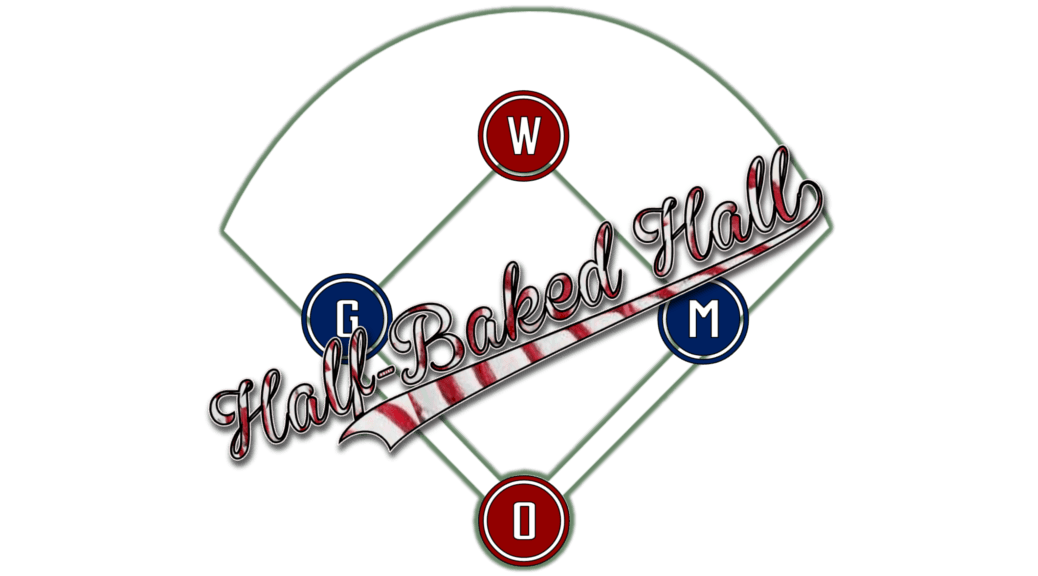Only two years for this ballot, as many above average players all decided to quit at the same time. You may have heard of one of the new guys.
Ballot Due Date: Monday, September 29th. I'll send it out sometime next week.
Last Time On The Ballot
Pete Browning
Charlie Comiskey
Monte Ward
New Hitters
Ginger Beaumont
Bill Dahlen
Elmer Flick
Topsy Hartsel
Willie Keeler
Freddy Parent
Harry Steinfeldt
Fred Tenney
Roy Thomas
New Pitchers
Harry Howell
Addie Joss
Sam Leever
Deacon Philippe
Jesse Tannehill
Rube Waddell
Vic Willis
Cy Young


Never heard of Beaumonthttps://wgom.org/wp-admin/post.php?post=32358&action=edit, but it sounds familiar.
He was way ahead of his time.
You may have heard of one of the new guys.
Aww-yeah! Rube Waddell!
Well, both him and Joss are familiar, but I can't exactly say why.
Well both are Hall of Famers, so maybe that's why? Also, Joss has second lowest ERA of all-time.
Rube Waddell is also goofier than a pet coon, if I'm thinking of the right guy.
I always loved taking Joss yard with Killebrew in the Earl Weaver Baseball game on my folks' Macintosh SE.
I loved that game! Especially when a pixelated Weaver would argue a call and kick dirt on the umpire.
I hope Topsy Hartsel was good, because I really want to vote for him.
I don't care if he was good, because I really want to vote for him.
How good could Cy Young really have been. He won zero Cy Young awards.
Overrated? You decide.
Are you sure? I thought he won so many that he changed his name to match the award.
I thought it was called the Cy Young because no other pitcher could ever hope to win an Old Hoss Award?
They don't give anyone the Old Hoss award, they throw it at them
People always talk about his wins, but nobody ever talks about his interceptions.
Joss was elected to the Hall despite only playing nine years thanks to some heavy campaigning that he should be allowed because of his premature death. During the spring of his age 31 season, he contracted meningitis and died three days later.
I'll certainly be voting for him.
Joss was born in Woodland, Wis,. and studied engineering at the University of Wisconsin. According to the Repository, he later put his studies to good use:
He also worked as a sportswriter and sports editor for the Toledo News-Bee and the Cleveland Press.
He's got my vote.
I'll vote for anybody that also has a strong background in math/science. Consider me sold!
Spooky was right, Rube was goofier than a pet coon, and was possibly the most famous baseball player to non-baseball fans before Babe Ruth. Clinically, it looks like he may have had a developmental disorder. When he was 21 years-old, he had the intellectual maturity of a 7 year old. He was in and out of baseball a few times, was suspended multiple times for unruly behavior, including openly mocking his opponents. He was drunk a lot and had very public marriages and divorces. He would sometimes leave the team without permission to play semi-pro ball. He would shoot marbles with kids before games. He once joined a traveling show, once wrestled an alligator, and ran a marching band. He would also join local rescue squads to fight fires or save kids from falling under the ice. He was great at golf and played pro football one year for Connie Mack.
Eventually he played for the Minneapolis Millers, and then for a small team in Virginia. He died at 37 from tuberculosis. Crazy life.
I was surprised the stark difference between his JAWS score and his ranking on B-Ref's fan EloRater. 59th and 10th respectively.
Read lots of SABR bios and came away with a lot of fun trivia
Ginger Beaumont: Wielded a 55 oz bat.
Elmer Flick: Career cut short by what was believed to be gastritis
Willie Keeler: Struck out only TWO times in 1899 with 633 plate appearances. I'd like to see him face Phil Hughes.
Harry Steinfeldt: Died at 37 due to cerebral hemmorhage
Fred Tenney: In 1897 turned what is believed to be the first ever 3-6-3 double play. Apparently, the crowd gasped at the sight.
Roy Thomas: Was such a master at fouling off pitches, he inspired the league to make the first two foul balls strikes. Got so many of hits via bunt that when he got older and slower he was no longer effective. His career batting average is .290 and his career slugging is .333. That's a lot of bunts.
Harry Howell: Eddie Collins once said, "Howell used so much slippery elm we could see the foam on his lips and on hot days some of the boys thought he was about to go mad." Emphasis mine. I didn't realize that was a synonym for saliva. One year, 35% of his runs were unearned because his fielders couldn't handle the slippery ball well.
Addie Joss: Died at 31 while still pitching great. Studied engineering in his spare time and invented an electronic scoreboard for his stadium. Pitched a perfect game in his last game of the season with the Naps shooting for a pennant in 1908.
Sam Leever: Saw an obituary of himself long before he died. "he had a great deal of enjoyment out of reading his own obituary, and he appreciates all the nice things that were said about him, but he insists that he is not even half-dead."
Died at 37 due to cerebral hemmorhage
cerebral hemorrhage = flu-like symptoms = hangover
Dang.